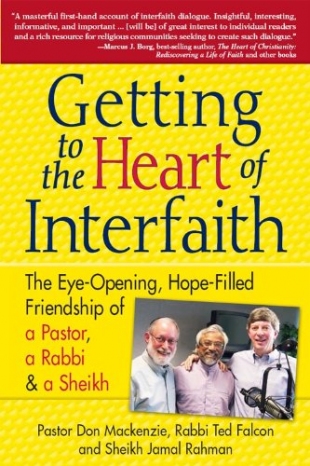They are called the "Interfaith Amigos" — Don Mackenzie, a recently retired United Church of Christ minister; Ted Falcon, a rabbi and popular teacher of meditation and spirituality; and Jamal Rahman, a Sufi sheikh and co-founder of Interfaith Community Church. Together for many years they have spoken at conferences, hosted an Interfaith Radio show, taught others the essentials of dialogue and collaboration, and celebrated Ramadan and seder together in Seattle with Christians, Jews, and Muslims.
The perspective they explore in this adventuresome paperback is an inclusive spirituality which can serve as a healing balm for the wounds suffered by people and the planet. Their intention as delineated in the introduction is to "celebrate the shared healing wisdom, compassion, and vitality at the heart of the three Abrahamic faiths." The spirituality they describe "embraces differences and makes no demand that we all experience the same things. It takes us beyond our particular beliefs into shared values of love, compassion, and peace toward which we are all striving."
Mackenzie, Falcon, and Rahman begin with an exploration of the five stages of the interfaith journey:
• Moving beyond separation and suspicion
• Inquiring more deeply
• Sharing both the easy and the difficult parts
• Moving beyond safe territory
• Exploring spiritual practices from other traditions
The Interfaith Amigos began working together after 9/11, and they each share their personal faith stories. This is followed by an examination of what they call the core of their traditions: the pastor (love), the rabbi (The Sh'ma), and the sheikh (compassion). Each then talks about things in his tradition that he is uncomfortable with and those things they are grateful for. In a very interesting section, The Interfaith Amigos visit Israel and Palestine together and confront the elephant in the room.
But the best chapter of all is the last one on the value of exploring spiritual practices from other traditions. Here Mackenzie shares Sabbath moments, journaling as lectio divina, and listening to music. Falcon offers a prayer of gratitude to begin the day and nighttime forgiveness practice. Rahman's practices include five techniques for opening the heart. They conclude:
"Spiritual practices from a wealth of traditions can help awaken you to your deeper spiritual identity, to the fullness of your human potential. Because this is so, the very nature of your experience in the world can shift. Not only will you find a rejuvenation of soul, of mind, and of body, but this final stage of the interfaith process will allow you to celebrate this healing together with other people on the interfaith journey."
